- Home
- Karen Kingsbury
A Thousand Tomorrows / Just Beyond the Clouds Page 3
A Thousand Tomorrows / Just Beyond the Clouds Read online
Page 3
But instead of ordering him home or threatening him for his actions, the coach gave a single nod. The hint of a rusty old smile tugged on his lips. “You know something, Cody Gunner? I think you’ll be a pretty good one.”
After that, there was no turning back.
Cody’s birthday was three weeks later, in June. He wanted just one thing—tuition and transportation to a bull-riding school in Colorado.
“Bull riding?” His mother frowned. “Cody, that’s the craziest sport on earth.” She crossed her arms and tapped her foot. “You can do anything but that.” She turned back to the dishes she’d been doing. “Play football like your daddy. At least then you’ll go head-to-head with a boy your size. Not a bull.”
Football like his daddy? Cody felt his gaze harden. He had nothing but contempt for his mother. After all this time she still didn’t get it, didn’t understand him. Sure, she was easy on him. She didn’t give him rules the way other boys had rules from their parents. Instead she gave him whatever he wanted, and peppered him with questions. “Cody, how are you?” “Cody, what’re you thinking?” “Cody, what are you feeling?” “Cody, what’s wrong?”
He was sick of her questions, sick of her trying to make up for the fact that he didn’t have a dad. She never hassled him about his attitude or lack of kindness, even when he secretly wished she would.
But if she could suggest football, she didn’t even know him.
Carl Joseph must’ve heard the conversation because he pushed his way between them. He was eight by then, as sweet and simple as he’d been at two. “Cody, brother, c’mere!”
The heat in Cody’s anger cooled. Carl Joseph was his best friend, the only one he could trust. Cody couldn’t count the times he’d wished it were he and not Carl Joseph who’d been born with Down syndrome. Because at least Carl Joseph was happy, too simple to understand even that their father had gone away, let alone the reasons why. Carl Joseph’s eyes were honest and full of light, and his enthusiasm knew no limits. He called Cody “brother,” and Cody called him “buddy.”
Carl Joseph grabbed his hand and pulled. “C’mon, brother, talk to me.”
“Just a minute, buddy.” Cody glared at his mother. “It’s Mom’s turn.”
“No, Cody!” Carl Joseph grinned big and tugged a little harder. His voice was loud, excited.
This time Cody couldn’t resist. He gave his mother a look and let himself be pulled into the next room. When Carl Joseph thought they were alone, his eyes sparkled. “You gonna ride a bull, Cody?”
Cody’s heart swelled at the transparent look in his brother’s eyes. A look of thrill and pride and expectancy. “Yes, buddy. I’m gonna be a bull rider.”
“Remember, brother? We watched bull riding on TV?” He rocked back and forth, nervous, anticipating.
“We sure did, buddy.” Cody put his arm around Carl Joseph’s shoulders and gave him a sideways hug.
Carl Joseph let out a whooping victory cry. He slid from Cody’s grasp, marched his feet up and down and moved in a tight winner’s circle around Cody. His arms punched at invisible targets. “Bull riding! Brother’s gonna be a bull rider!”
As Cody watched Carl Joseph that familiar fierce protection reared up in his heart. Once, a few years after their father left, a kid in his class pointed at Cody and laughed. “His brother’s a retard! He lives in my neighborhood.”
Never mind that the kids were taking a spelling test. Cody had the guy pinned before he had time to cry for help. It took the teacher and a passing custodian to pull Cody off the boy. It was the last time anyone at Davis Elementary said anything mean about Carl Joseph.
Watching him now, the determination in Cody’s heart grew. No one better ever harm Carl Joseph, not ever. His brother stopped, drawing loud, exaggerated breaths. “I’m tuckered out, brother.”
Cody smiled. “Yeah, you look like it.”
So what if his mother didn’t approve? He’d already made up his mind. The fact that Carl Joseph was excited only made him that much more sure.
Cody brushed his knuckles along the top of Carl Joseph’s head. “We’ll talk later, okay?” He made a face. “Mom’s waiting.”
“Right.” Carl Joseph nodded, and did his best imitation of Cody’s grimace. “Mom’s waiting.”
Cody grinned. What wasn’t there to love about Carl Joseph? He turned and found his mother waiting in the kitchen. Her arms were crossed.
“What was that all about?”
“Carl’s happy for me.” Cody stuck out his chin. “I’m fourteen in a few weeks, Mom. I wanna go to bull-riding school. That’s all I want.”
Her look said everything her words didn’t.
She wanted to be mad, wanted to tell him all the things any mother would tell her son if he came home wanting to be a bull rider. People were killed riding bulls; trampled and maimed and paralyzed. A body could age four decades in as many seconds in a sport that violent and unpredictable. But she must’ve seen the determination in Cody’s eyes, because she blinked.
And that single blink told Cody he’d won.
The arrangements came together quickly, and by the time he arrived home from bull-riding school, he couldn’t think of anything but getting a seat on the next bull.
Quickly Cody learned something about bull riders. The very good ones rode because they loved the sport, because they’d loved it since they were old enough to jump on the back of a sheep. For those riders, every go-round was an unequaled adrenaline rush, an addictive high that knew no match.
Cody was nothing like those cowboys.
Through middle school and high school, past his eighteenth birthday when he qualified for his Professional Rodeo Cowboys Association card; through event after event when sheer fury drove him to stay on bulls that couldn’t be ridden; through the first two seasons when he first noticed Ali, the first two seasons when people started whispering that maybe there was no better bull rider than the independent Cody Gunner and no better barrel racer than the untouchable Ali Daniels, through all the travel and women and rank rodeo stock, he couldn’t get one thought out of his head:
His father walked out of Carl Joseph’s life because the kid had Down syndrome, because something was clearly wrong with that son. Cody had heard him say so. But what about the other son, the older son? What about him? The man had left Cody, too, and the thing Cody could never quite figure out was this: What, exactly, was wrong with him?
It was this question that stoked the coals of his anger, even when his past seemed forever behind him. No, Cody didn’t ride bulls because he loved the rush. The rush was there, and it was real enough. Cody rode because battling a two-thousand-pound bull for eight seconds was the only way to live with the rage.
And as Cody Gunner moved into the public limelight, as he became the talk of the Pro Rodeo Tour, the invincible, undefeatable cowboy, it was that part he kept a secret. The fact that he didn’t ride for the love of the sport; he rode because he had to.
Chapter Three
Ali Daniels sat in her trailer, not far from her mother, and stared out the window.
“This is my year.” She gripped the arms of the swivel chair, her eyes unblinking.
“Yes.” Her mom stood. “I can feel it.” She opened a cupboard next to the miniature sink and pulled out a bulky vest. “Here.” She handed it over. “Let’s go, Ali. It’s time.”
A slow breath eased across Ali’s lips. “Okay.” She took the vest, slipped one arm through, then the other, and zipped it. A few more snaps and she was ready. She looked out again and saw a group of bundled-up cowboys making their way across the snow-covered parking lot toward Stadium Arena. They laughed, listening to the shortest one in the group, hanging on to whatever story he was telling. Not far back, three couples followed, headed the same way.
This was Denver in late January, the season opener; festivities at the National Western Stock Show and Rodeo would start early and end late. Ali didn’t mind missing the hoopla, as long as she was ready for her ride. The rid
e was all that counted.
She sat at the edge of her chair and kept her eyes on the people; so many people. Good for them for coming out, for cheering on the deserving professional rodeo riders and wranglers. But Ali didn’t need them. She would’ve competed in an empty arena.
Anything to fly across the dirt, power and grace, an extension of the horse she’d spent years training. Sometimes she wasn’t sure which of them loved the ride more, she or the muscled palomino horse she’d raised from birth.
“Ali?” Her mother touched her shoulder. “You okay?”
“Yeah.” Her answer was quick. The walls of her chest ached, tighter than usual. Every breath was difficult, intentional, but what else could she say? How she felt wasn’t a part of the equation; it never had been. “I’m fine.”
“All right.” She hesitated. “I’ll get ready.”
Familiar thoughts swirled about in Ali’s heart.
Her popularity was building, not only because she was winning rodeos. She was a mystery, someone they’d dubbed beautiful and unreachable. She leaned forward and winced; the vest was tighter than usual. Yes, the public, the media, all of them held her up and examined her in the limelight. But there was very little she let them see.
She kept to herself, in her trailer with her mother or in a quiet corner of the locker room just long enough to change into her riding clothes. Friendships would be nice, but the less time she spent in the arena the better. She arrived in the tunnel minutes before each ride, and after the event she gathered her things and gave her horse a quick cooldown. Then she changed and headed back outside. The other barrel racers thought her distant, haughty, too good for them.
That wasn’t it, but she couldn’t explain herself. Not without giving away her secret, not without solving the mystery.
Her routine, her last-minute entry and quick exit from the arena, meant no time for cowboys, either. Just about all the single rodeo men and a few of the married ones had tried to hit on her in the past two years. Once in a while she would catch a smile or a glance from a cowboy who seemed nice enough. But there was no point, nothing she could offer in return.
Not when she was singly focused on two goals: staying healthy and being the best barrel racer in the world.
But the thing that really set her apart was something no one on the tour would ever know about. At least not while she was still competing. People wouldn’t understand; they’d ask questions and make pronouncements about the risks and dangers. Before long the story would be out, and everyone would stop seeing her as the most promising barrel racer in rodeo.
Instead, they’d see her for her battles.
That would never happen; Ali was determined. Pro Rodeo would never know about her battles, her secret. They would never find out that she did something no other barrel racer did:
She held her breath when she rode.
From the tunnel around each of the three barrels, and back, she didn’t draw a bit of air. The hooves of her horse would keep time with her heartbeat as the seconds played out, one after another. By the time she hit the tunnel again, she was desperate for air, her lungs screaming for relief.
Small wonder that she regularly clocked in at less than eighteen seconds. Whether she was riding at the arena back home or racing for the national championship, every bit of her strength—even the energy it took to breathe—was focused on the ride. The fact that Ali held her breath when she raced was something only her parents knew about. Given the circumstances, they agreed that not breathing during the ride was her best chance of remaining a competitor.
It would be their secret.
So after two full years on the tour, Ali Daniels remained a curiosity, a blue-eyed rider with a thick ponytail of pale blonde hair, black hat and jeans, blazing across the arena on a horse as fair as she was. Reporters would ask her questions after a win, but her answers were never more than a few words. The details of her life went unknown.
The way they would stay.
ALI DREW A slow breath and adjusted the vest. It was never comfortable; especially just before a ride, when all she wanted was to break free, run outside, saddle up Ace, and ride like the wind around the outside of the arena.
She bit her lower lip. Patience. There was no riding without patience.
The truth was, she shouldn’t have been here at all—not her, and not Ace. Ace was a quarter horse so small at birth his owner was willing to give him away. Only Ali had seen the horse’s potential, rearing him and coaxing him and hand-feeding him until he was as big and strong as any horse on the tour.
That alone was shocking, because Ali’s parents never wanted anything to do with horses.
Ali and her younger sister, Anna, grew up on a cattle ranch in Colorado, where her father made the rounds on an ATV quad-runner. Horses were off-limits, too much dander and dust, too many allergens, too great the chance that Ali and Anna might get sick. Because of their allergies, the sisters took their lessons at home in rooms cleaned by air purifiers. They were taught to read and sew and play the piano. Outdoor time was kept to a minimum.
But in the evening, when their parents were busy, Ali and Anna sat by the bedroom window and dreamed of another life. Ali remembered one time more clearly than the others.
“You know what I wanna do?” Anna’s eyes sparkled that evening. “I wanna race through the forever hay fields and play hide-and-seek out by the tallest pine trees, and jump on that palomino horse next door.” Anna was eight that year; Ali nine. The idea seemed wild and outrageous and terribly exciting. “Wouldn’t that be something?”
“Yes.” Ali squinted at the world beyond their sterile confines. “One day we will, okay, Anna? One day.”
But the chance never came.
One afternoon when Anna was ten, she caught a cold. Something must’ve blown into the house from the garden, their mother always guessed. The cold became bronchitis, quick and fast. An asthma attack sent her to the hospital, and by the next day she had a respiratory infection. Within forty-eight hours her fever raged out of control. Pneumonia set in and because of her situation, no doctor or antibiotic could do a thing to help her. All their attempts at safety, all the years spent watching life through a window, had done nothing to save Anna. Three days later she was gone.
Anna’s death changed everything for Ali, and she made up her mind. She would not watch life from a window; she would live it to the fullest, doing everything Anna had dreamed of doing.
The memory dissolved and Ali adjusted her vest again. She tried to draw a deep breath, but it wouldn’t come; not fully.
She still had a few hours before her ride, so remembering helped pass the time. The season opener always stirred up the past, bringing reminders of how fortunate she was, how hard she’d fought against the odds and how easily this season-or any season—could be her last.
The pretty horse next door had a foal, and the foal became Ali’s closest friend. He was the color of caramel custard with a mane the same pale blonde as Ali’s long hair. She named him Ace, and against the odds, against the doctor’s warnings, she spent every spare moment with him and grew stronger for it. With the neighbor’s help, she broke him and trained him and learned to fly across the fields behind her parents’ home.
Eventually she discovered barrel racing, and her father built an arena and a barn, with a custom air-filtration system to reduce the allergens from damp hay and horse dander. Ali remembered once when her aunt and uncle asked how her parents could be a willing party to something that might shorten their daughter’s life.
Ali never forgot her father’s answer. “Riding horses is Ali’s life,” he told them. “It’s that simple.”
So it was.
On Ace she not only had a purpose—to round the barrels faster than anyone had before—but she felt vibrant, all of life bursting within her. And that feeling defied any sense of reason, because doctors and medicine and statistics said she should be dying.
The mystery was this: Ali Daniels had cystic fibrosis.
&nb
sp; Cystic fibrosis—with all its terrible limitations and its lifetime sentence of having her back pounded two hours each day so she could cough up the thick secretions that would otherwise choke her. CF, the doctors called it, the same condition Anna had been born with. The disease in which every cold could go into pneumonia; and every bout of pneumonia could mean death.
Ali’s parents never told her the prognosis for people with cystic fibrosis. She found it for herself—on the Internet. Patients with CF usually died as young adults, and though the life expectancy had risen, the outcome was certain.
One day, not too far off, the disease would kill her.
Ali adjusted her position again. The vest was tight against her ribs, tight and uncomfortable. It wasn’t for protection, the way the bull riders’ vests were, though hers was customized to look like theirs. Rather, it was a compression vest. Powered by electricity, the vest had a series of air chambers, which rhythmically compressed Ali’s lungs. The vest did mechanically what used to be done only by Ali’s parents pounding on her chest and back.
One way or another, her lungs had to be cleared.
She leaned forward and let the vest work its magic. Ten more minutes and she’d be done. A series of coughs came over her, productive coughs. The type that kept her healthy. When she was finished, she closed her eyes and remembered again.
Her first rodeo came before her fourteenth birthday, the first time she and Ace tore around the barrels for a winning time. Three years later she hit the Pro Rodeo Tour, and she’d been hard to beat ever since.
Same as Cody Gunner.
The two of them were alike, both quiet, distant. Mysterious.
Ali was no longer amazed at how the crowd responded to Cody, how whole sections of women in the stands would wave their arms and chant his name when Cody received another saddle or a buckle. The sight of a six-foot-two bull rider with short dark hair, unrelenting blue eyes, and a confidence bigger than the arena left them collectively breathless.

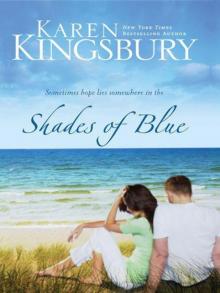 Shades of Blue
Shades of Blue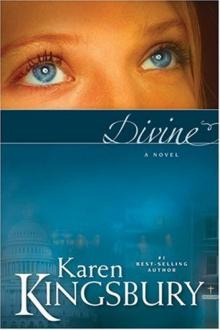 Divine
Divine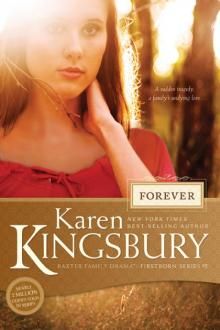 Forever
Forever Summer
Summer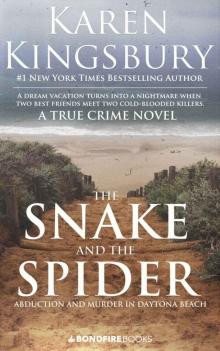 The Snake and the Spider
The Snake and the Spider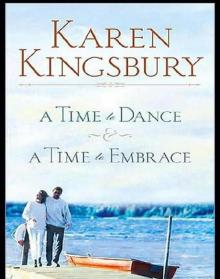 A Time to Dance
A Time to Dance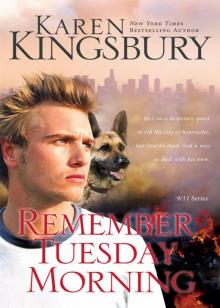 Remember Tuesday Morning
Remember Tuesday Morning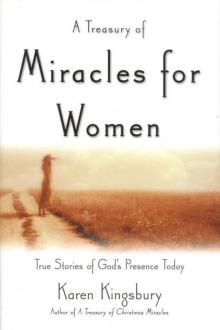 A Treasury of Miracles for Women
A Treasury of Miracles for Women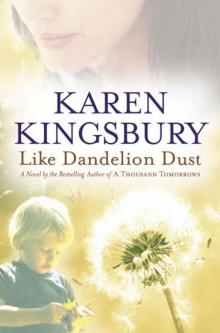 Like Dandelion Dust
Like Dandelion Dust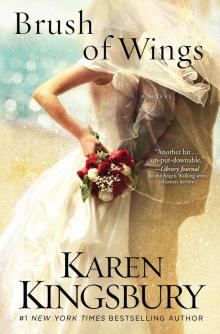 Brush of Wings
Brush of Wings The Tuesday Morning Collection
The Tuesday Morning Collection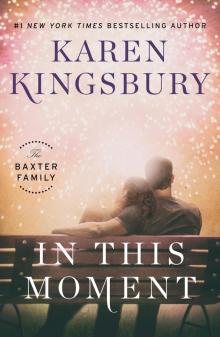 A Moment of Weakness
A Moment of Weakness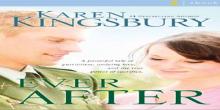 Ever After
Ever After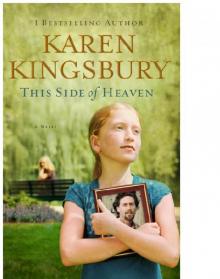 This Side of Heaven
This Side of Heaven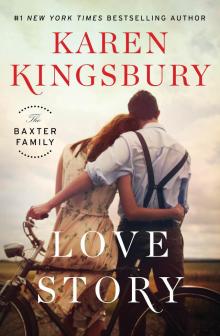 Unlocked: A Love Story
Unlocked: A Love Story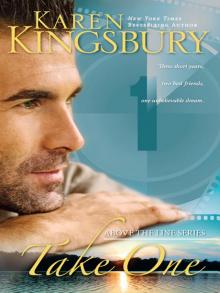 Take One
Take One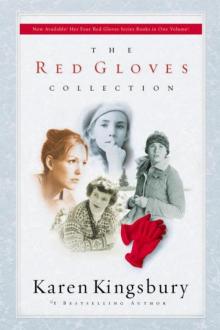 The Red Gloves Collection
The Red Gloves Collection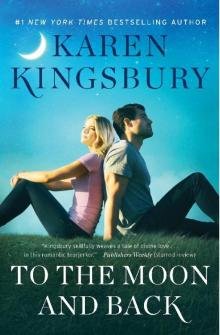 To the Moon and Back
To the Moon and Back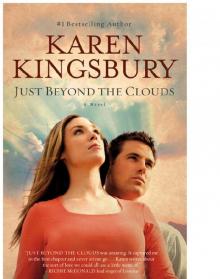 Just Beyond the Clouds
Just Beyond the Clouds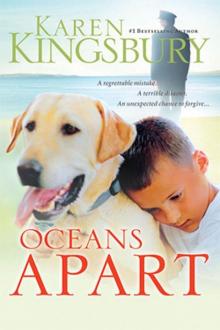 Oceans Apart
Oceans Apart A Baxter Family Christmas
A Baxter Family Christmas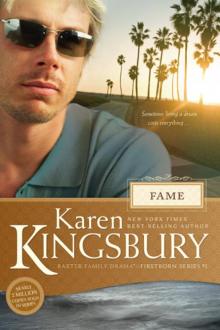 Fame
Fame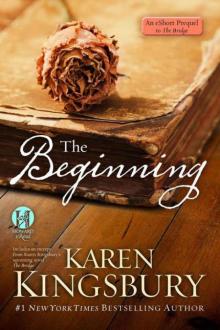 The Beginning
The Beginning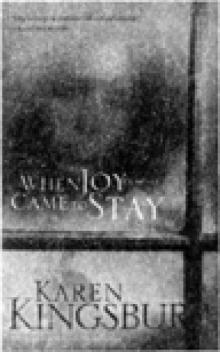 On Every Side
On Every Side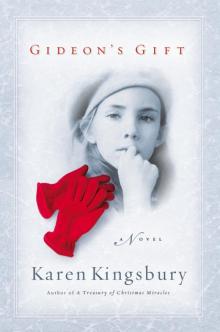 Gideon's Gift
Gideon's Gift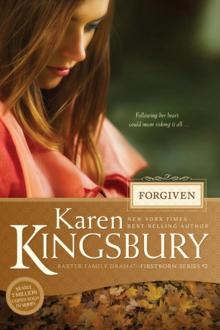 Forgiven
Forgiven A Kingsbury Collection
A Kingsbury Collection Found
Found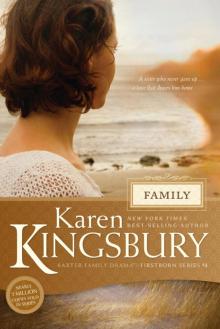 Family
Family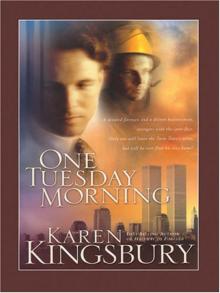 One Tuesday Morning
One Tuesday Morning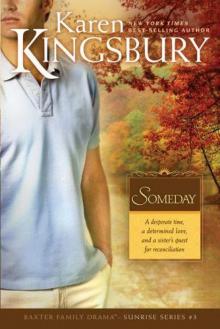 Someday
Someday Take Three
Take Three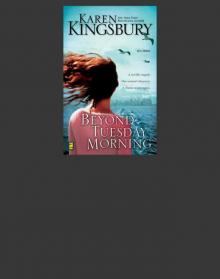 Beyond Tuesday Morning
Beyond Tuesday Morning Unlocked
Unlocked Take Four
Take Four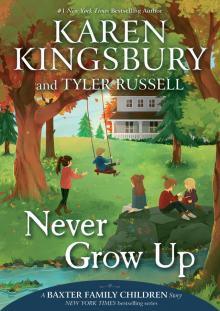 Never Grow Up
Never Grow Up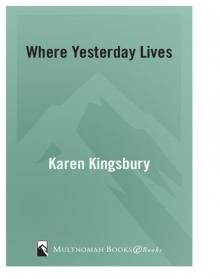 Where Yesterday Lives
Where Yesterday Lives Two Weeks
Two Weeks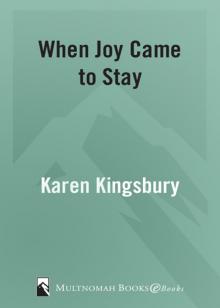 When Joy Came to Stay
When Joy Came to Stay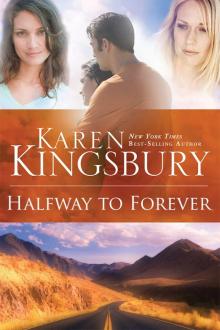 Halfway to Forever
Halfway to Forever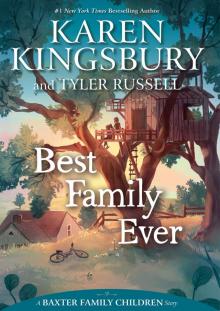 Best Family Ever
Best Family Ever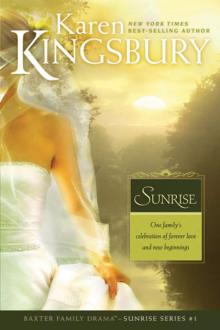 Sunrise
Sunrise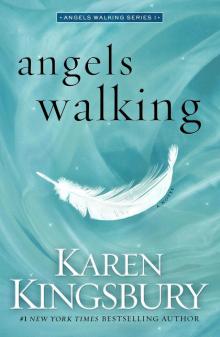 Angels Walking
Angels Walking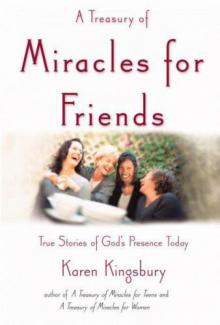 A Treasury of Miracles for Friends
A Treasury of Miracles for Friends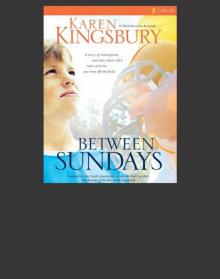 Between Sundays
Between Sundays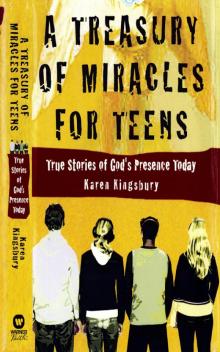 A Treasury of Miracles for Teens
A Treasury of Miracles for Teens A Thousand Tomorrows / Just Beyond the Clouds
A Thousand Tomorrows / Just Beyond the Clouds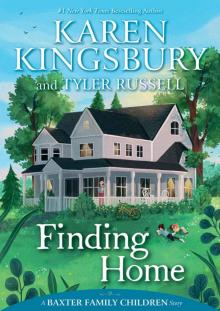 Finding Home (A Baxter Family Children Story Book 2)
Finding Home (A Baxter Family Children Story Book 2)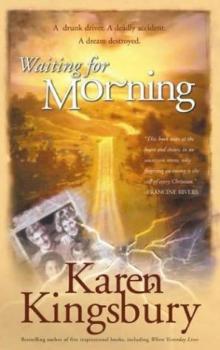 Waiting for Morning
Waiting for Morning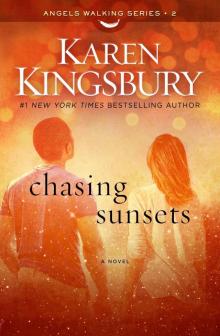 Chasing Sunsets
Chasing Sunsets Two Weeks: A Novel (The Baxter Family)
Two Weeks: A Novel (The Baxter Family) Coming Home
Coming Home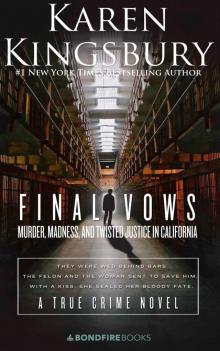 Final Vows
Final Vows Sunset
Sunset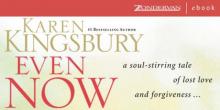 Even Now
Even Now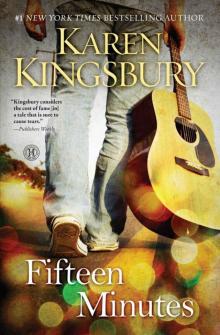 Fifteen Minutes: A Novel
Fifteen Minutes: A Novel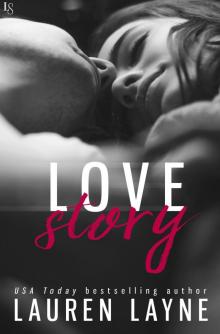 Love Story
Love Story The Bridge: A Novel
The Bridge: A Novel One Tuesday Morning & Beyond Tuesday Morning Compilation
One Tuesday Morning & Beyond Tuesday Morning Compilation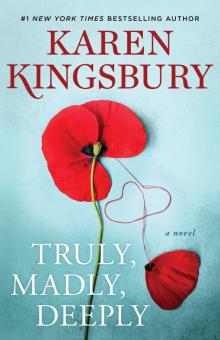 Truly, Madly, Deeply
Truly, Madly, Deeply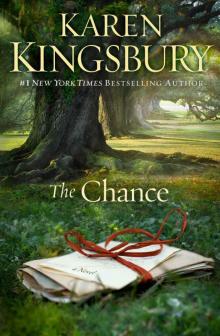 The Chance: A Novel
The Chance: A Novel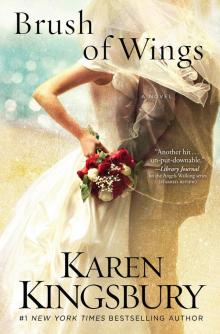 A Brush of Wings
A Brush of Wings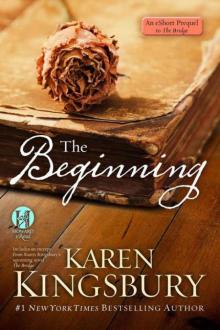 The Beginning: An eShort Prequel to the Bridge
The Beginning: An eShort Prequel to the Bridge A Thousand Tomorrows & Just Beyond The Clouds Omnibus
A Thousand Tomorrows & Just Beyond The Clouds Omnibus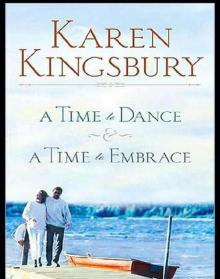 A Time to Dance/A Time to Embrace
A Time to Dance/A Time to Embrace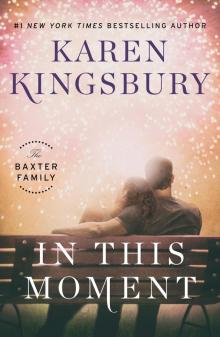 In This Moment
In This Moment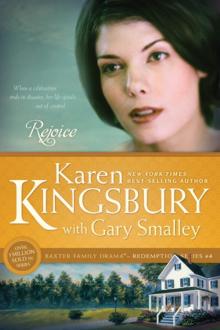 Rejoice
Rejoice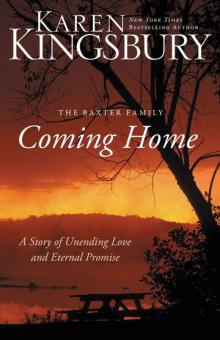 Coming Home: A Story of Undying Hope
Coming Home: A Story of Undying Hope